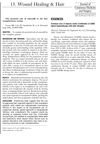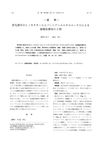Carpronium chloride hydrate
Research
20 / 32 results
research Advances in the Management of Alopecia Areata
New treatments for severe hair loss often fail, but some patients see hair regrowth with specific therapies, and treatment should be tailored to the individual's situation.

research Alopecia Areata: An Update
The document concludes that alopecia areata is an autoimmune disease without a definitive cure, but treatments like corticosteroids are commonly used.

research Degree of Alignment Between Japanese Patients and Physicians on Alopecia Areata Disease Severity and Treatment Satisfaction: A Real-World Survey
Japanese patients and physicians often disagree on the severity of Alopecia Areata and treatment satisfaction, needing better communication and treatments.

research Hair Care Cosmetics: Functions and Ingredients of Shampoos, Rinses, and Hair Growth Promoters
The document explains how shampoos clean, rinses condition, one-step shampoos offer convenience, and hair growth promoters aim to prevent hair loss, emphasizing the importance of scientific evidence for their effectiveness.
research Effects of Carpronium Chloride on the Microvascular Blood Flow in Rat Mesentery Using Intravital Videomicroscopy
Carpronium chloride increases blood flow by widening small blood vessels.
research Seventeen Cases of Alopecia Areata: Combination of SADBE Topical Immunotherapy with Other Therapies
Combining SADBE with other treatments can help hair regrowth in alopecia areata patients.
research Interventional Evaluation of Monoammonium Glycyrrhizinate-Glycine/DL-Methionine Combination Tablets in Mild Alopecia Areata
The combination therapy may be more effective for mild alopecia areata, especially in patients with allergies.
research Advanced Technology of Hair Follicle Regeneration
Recent advancements in hair regeneration include new research, improved treatments, and effective hair growth agents.

research Guidelines for the Diagnosis and Treatment of Male-Pattern and Female-Pattern Hair Loss, 2017 Version
Use finasteride, dutasteride, and minoxidil for hair loss treatment.

research Wound Healing and Hair: The Role of Minoxidil in Hair Transplant Patients
Minoxidil may improve hair transplants and combining treatments could help alopecia areata.

research Clinical Significance of Dermoscopy in Alopecia Areata: Analysis of 300 Cases
Dermoscopy helps diagnose and manage alopecia areata by showing specific hair changes.

research Low-Level Laser Therapy for Treatment of Hair Loss
Low-Level Laser Therapy is effective and safe for hair growth with minimal side effects.

research Androgenetic Alopecia: An Update
Minoxidil and finasteride effectively treat hair loss.

research Scalp Dermoscopy of Androgenetic Alopecia in Asian People

research Topical Immunotherapy in Alopecia Areata
Topical immunotherapy, especially with DPCP, is effective for treating severe alopecia areata.

research Guidelines for the Management of Androgenetic Alopecia (2010)
Use minoxidil for hair loss treatment, and finasteride for men.

research Low-Level Light Therapy for Cosmetics and Dermatology
Low-Level Light Therapy is effective for skin rejuvenation, wound healing, and hair growth, with mild side effects.

research Headgear-Induced Temporary Pressure Alopecia
A boy's hair grew back after he stopped using orthodontic headgear that caused temporary hair loss.

research Hair Physiology: Hair Growth, Alopecia, Scalp Treatment, Etc.
The document concludes that new treatments for hair loss may involve a combination of cosmetics, clinical methods, and genetic approaches.

research Two Cases of Allergic Contact Dermatitis to Hinokitiol and Pantothenylethylether in Hair Growth Promoter
Hinokitiol and pantothenylethylether in hair products can cause strong allergic reactions.